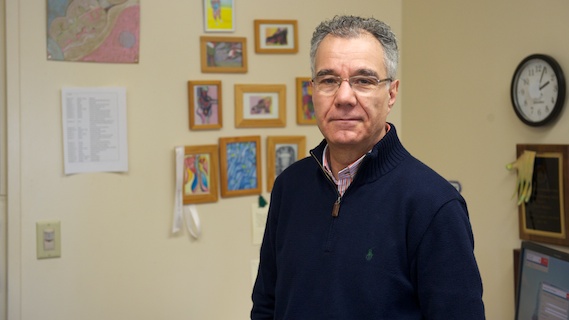
Born in Toledo, Spain, BMCC’s Modern Languages Professor Hilario Barrero moved to New York City in 1978, and “the first thing I did,” he says, “was go to Barnes & Noble and open an anthology of American poets.”
This began a 30-year labor of love—translating poems from English to Spanish—and culminated with the 2011 release of Lengua de madera, Antología de poesa breve en inglés (Tongue of Wood, An Anthology of Short Poems in English), from the prestigious Spanish press, La Isla de Siltolá.
“I remember the first poem I translated: ‘A Pact’ by Ezra Pound,” Barrero says. “Little by little and for my own pleasure, I started a personal anthology that, after many years, has become a book consisting of 171 poems by 71 poets . . . almost 400 years of short poems, starting with Robert Herrick, who lived from 1591 to 1674; ending with Richard Jones, born in 1953, and including many others in between, such as Blake, Yeats, Dickinson, Auden, Oliver, and Ginsberg.”
“One sings what one loses”
Barrero has also translated into Spanish, the work of renowned American poet Jane Kenyon: De otra manera (Otherwise), published in 2007 by Pre-textos, in Valencia, Spain. And soon, Pre-textos will release Barrero’s translations of work by former U.S. Poet Laureate Donald Hall, El sabor de la piedra, or The Taste of Stone.
In 1999, he began a series of diaries, and the most recent of these, Brooklyn en blanco y negro (Brooklyn in White and Black), published in 2011, commemorates his recently deceased mother.
Aging and death are recurring themes in Barrero’s work, belying its passion. “I want to be like a runner, full of life,” he says.
In 2011, a volume of his own poetry from the last ten years, Libro de familia, was published by Instituto Cultural/El Brocense, in Cáceres, Spain, and he will present a reading from his new book at the University of Malaga in Spain, this spring.
“One sings what one loses,” Barrero explains. “Poetry is a knife, a fire, a storm. And my poetry, now that I am growing old, is getting clearer, more humane, closer to people. My poetry now is less baroque and intellectual that in my previous book (In tempore belli). Libro de familia is a paper cemetery where all the people I lost, lie. It is a book made of stone and smoke, memories and presences as well as absences.”
Two hundred doves take flight
Barrero’s first foray into prose writing in English resulted in the chapbook Two Hundred Doves, released by Titulos Publicados in 2011. With cover art by Barrero, himself—he is an accomplished illustrator—the book is a lyric portrayal of the author’s father; a beloved, albeit difficult man:
“Where have his eight children gone? Does he recall the color of his mother’s eyes? When watering the trees, does he remember his children?”
When writing in English, Barrero says, “The words do not come to me as easily as they do in Spanish. I have to reach out to them, and beg them to come to me. I have to remember to keep the English syntax, the rhythm of the English language, to have a style. I may write with my Spanish ‘accent’, but the results must have an English flavor.”
“Poetry is life”
After earning his Ph.D. in 20th-century literature at the CUNY Graduate Center, Hilario Barrero taught at Princeton University for seven years, and after 9/11, joined the Modern Languages department at BMCC.
He has also traveled with BMCC’s Student-Abroad program to Orviedo, Spain, and his poem, “The Subjunctive Mood,” translated to English by BMCC Professor Regina Galasso and published in The Inquirer, BMCC’s faculty-edited journal, reflects on their experience:
“This will be their best summer ever / the one that they’ll remember tomorrow / when loneliness and routine / have trampled their beauty . . . But today they only think about, as I once did, / throwing themselves into the night, living it up, / looking death in the eye.”
Barraro has shared his work with students over the years, and nurtures their initial steps into writing. He loves teaching, he says, “because you are helping students discover a new way of thinking. And they love poetry. Poetry is life.”
STORY HIGHLIGHTS
- Professor Hilario Barrero just published an anthology of poems he translated to Spanish, over the course of 30 years
- He also just published a volume of his own poetry, Libro de familia, and released his first book of prose in English,Two Hundred Doves
- His translation of work by former U.S. Poet Laureate Donald Hall is forthcoming

